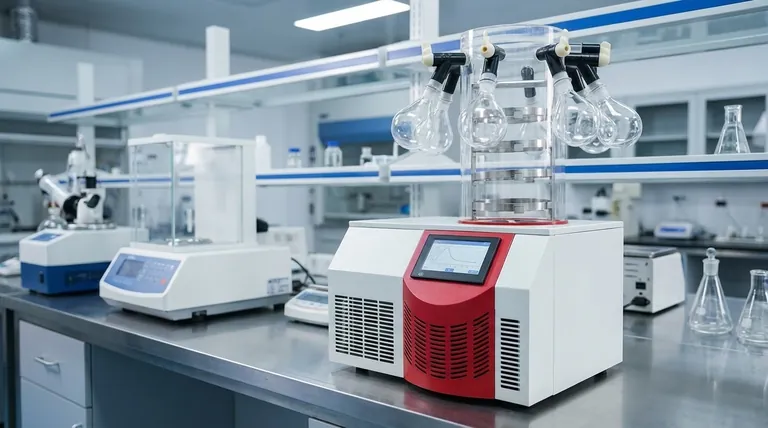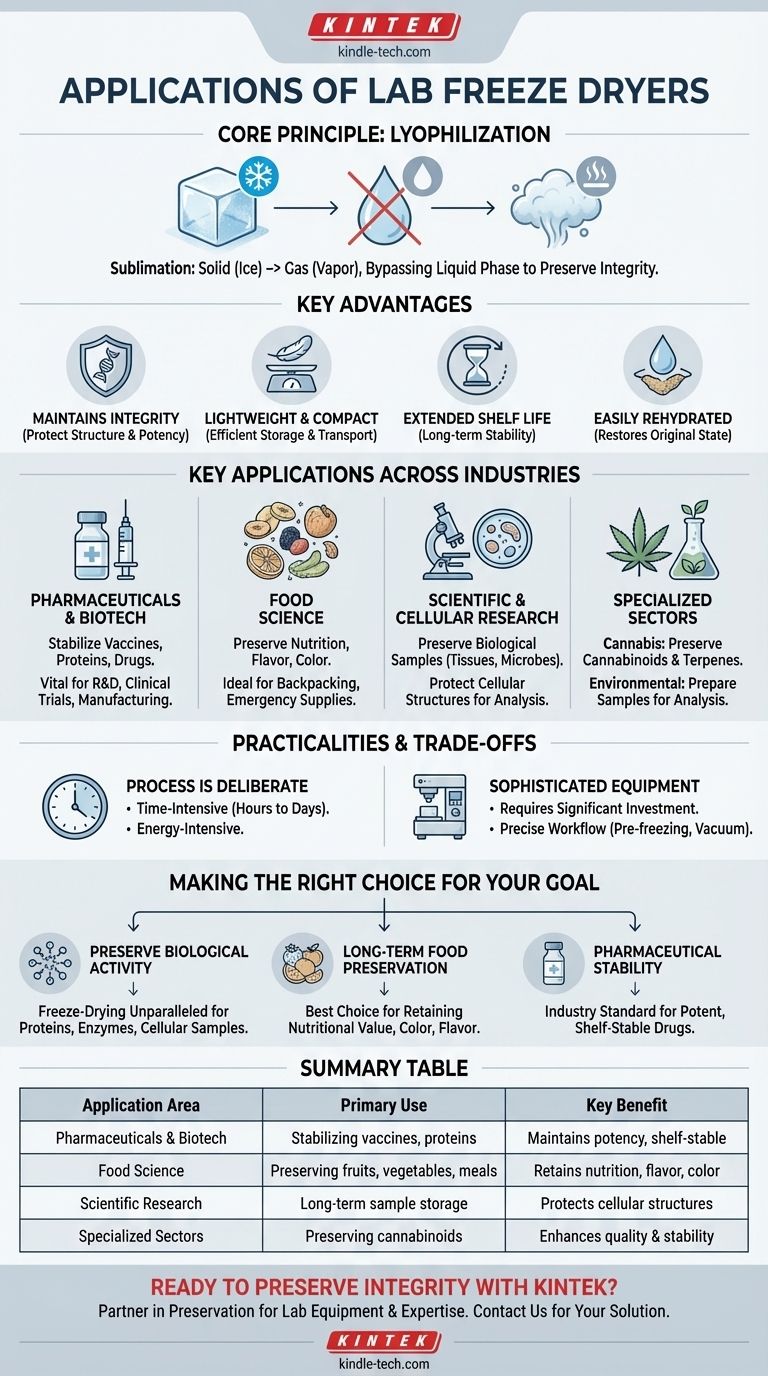At its core, a laboratory freeze dryer is a preservation tool. It is used across pharmaceuticals, biotechnology, food science, and scientific research to gently remove water from a substance, transforming it into a lightweight, stable solid without damaging its fundamental structure. This process, known as lyophilization, is critical for preserving everything from life-saving vaccines to delicate biological samples.
The true value of a freeze dryer isn't just in drying a substance—it's in preserving its original integrity. By turning water directly from a solid to a gas, it bypasses the destructive liquid phase, protecting the structure, potency, and quality of sensitive materials.

The Core Principle: Why Lyophilization is Essential
A lab freeze dryer's applications are a direct result of its unique preservation method. Understanding this process reveals why it has become indispensable in so many fields.
What is Lyophilization (Freeze-Drying)?
Lyophilization is a multi-step dehydration process. First, the material is frozen solid. Next, it's placed under a deep vacuum. Finally, a small amount of heat is introduced, causing the frozen water to sublimate—transforming directly from a solid (ice) into a gas (water vapor) without ever becoming a liquid.
This avoidance of the liquid phase is what makes freeze-drying so gentle and effective.
Key Advantages Over Traditional Drying
Heat-based drying methods can degrade or destroy delicate structures. Freeze-drying offers distinct benefits by maintaining the integrity of the substance.
The final product is lightweight and compact, making storage and transportation far more efficient. It also has a dramatically extended shelf life and can be easily rehydrated back to its original state.
Key Applications Across Industries
The ability to preserve sensitive materials makes lab freeze dryers a cornerstone technology in several critical sectors.
In Pharmaceuticals and Biotechnology
This is perhaps the most significant application. Freeze-drying is used to stabilize medications, such as vaccines, proteins, and other injectable drugs that would otherwise be unstable in liquid form.
The process is vital throughout the drug lifecycle: from stabilizing new drug candidates in research and development (R&D) to producing stable batches for clinical trials and small-scale manufacturing.
In Food Science
Food scientists use lyophilization to create high-quality preserved foods. Freeze-dried fruits, vegetables, and meals retain nearly all of their original nutritional value, flavor, and color.
This makes the technology ideal for producing lightweight, long-lasting products for backpackers, military personnel, and emergency food supplies.
In Scientific and Cellular Research
Biologists and researchers rely on freeze dryers to preserve biological samples like tissues, microbes, and proteins. This allows for long-term storage and later analysis without degrading the cellular structures or biochemical compounds.
In Specialized and Emerging Sectors
The applications continue to expand. In environmental studies, it's used to prepare samples for analysis. The cannabis industry uses it to perfectly preserve sensitive cannabinoids and terpenes, enhancing the quality and stability of the final product.
Understanding the Practicalities and Trade-offs
While powerful, freeze-drying is a specific tool for a specific job, and it's important to understand its operational realities.
The Process is Deliberate
Lyophilization is not a fast process. Depending on the material and volume, a single cycle can take many hours or even days to complete. It is significantly more time and energy-intensive than simple heat-based dehydration.
Equipment is a Key Consideration
Laboratory freeze dryers are sophisticated instruments that require a significant investment. Choosing the right machine involves considering your specific sample volume, budget, and the features required for your application.
The Operational Workflow
Using a freeze dryer involves a precise workflow. Materials must be properly pre-frozen before being placed on racks within the machine. A vacuum pump is engaged to lower the pressure, and after the cycle is complete, the chamber must be carefully brought back to atmospheric pressure before the stable, dry product is removed.
Making the Right Choice for Your Goal
The decision to use a freeze dryer should be driven by the need to preserve the essential characteristics of your material.
- If your primary focus is preserving biological activity: Freeze-drying is unparalleled for stabilizing vaccines, proteins, enzymes, and cellular samples by maintaining their delicate molecular structures.
- If your primary focus is long-term food preservation: This method is the best choice for retaining nutritional value, color, and flavor far more effectively than traditional dehydration.
- If your primary focus is pharmaceutical stability: Lyophilization is the industry standard for creating potent, shelf-stable drugs that can be stored and transported without refrigeration.
Ultimately, freeze-drying is the definitive solution when the integrity of the original substance is non-negotiable.
Summary Table:
| Application Area | Primary Use of Freeze Dryer | Key Benefit |
|---|---|---|
| Pharmaceuticals & Biotech | Stabilizing vaccines, proteins, and injectable drugs | Maintains potency and enables shelf-stable storage |
| Food Science | Preserving fruits, vegetables, and ready-to-eat meals | Retains nutritional value, flavor, and color |
| Scientific Research | Long-term storage of biological samples (tissues, microbes) | Protects cellular structures for future analysis |
| Specialized Sectors (e.g., Cannabis) | Preserving cannabinoids and terpenes | Enhances final product quality and stability |
Ready to preserve the integrity of your sensitive materials?
A lab freeze dryer from KINTEK is an investment in precision and reliability for your laboratory. Whether you are developing life-saving pharmaceuticals, conducting critical research, or creating high-quality preserved foods, our expertise in lab equipment ensures you get the right solution for your specific needs.
We specialize in providing the ideal freeze-drying equipment to help you:
- Stabilize delicate compounds like proteins and vaccines.
- Extend shelf life while maintaining original quality.
- Streamline your R&D and production processes.
Contact us today to discuss your application and find the perfect freeze-drying solution for your lab. Let KINTEK be your partner in preservation.
Visual Guide

Related Products
- Benchtop Laboratory Freeze Dryer for Lab Use
- Benchtop Laboratory Vacuum Freeze Dryer
- Laboratory Sterilizer Lab Autoclave Pulse Vacuum Lifting Sterilizer
- Laboratory Sterilizer Lab Autoclave Vertical Pressure Steam Sterilizer for Liquid Crystal Display Automatic Type
- Laboratory Test Sieves and Sieving Machines
People Also Ask
- What are the advantages of using freeze drying for phase change materials with biopolymer shells? Optimize Stability
- What is the purpose of an evaporator? The Key Component That Creates Cooling
- Why is a freeze dryer preferred for drying nickel nanoparticle precursors? Prevent Hard Agglomeration Now
- What is the function of a freeze dryer in the ice-templating process? Preserving Aligned Pore Scaffolds for LAGP
- Why is a freeze dryer preferred over thermal drying for Fe-ZTA cermets? Ensure Pure, Homogeneous Slurry Processing



















